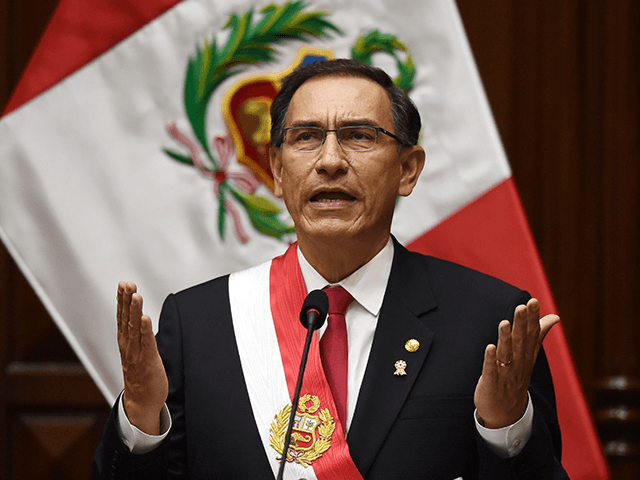China’s state-run propaganda outlet the Global Times on Monday ran cover for domestically developed coronavirus vaccines after ex-Peruvian President Martín Vizcarra announced that he and his wife had tested positive for the Chinese coronavirus after receiving the Sinopharm vaccine in October.
Vizcarra reportedly received the vaccine illicitly, part of an ongoing scandal known as the “VIP vaccine” events in Peru and Argentina where politicians and their friends received doses of Chinese coronavirus vaccines before medical authorities had approved their use for the general public.
Vizcarra announced via Twitter on Sunday that he and his wife had tested positive for the Chinese coronavirus and had entered quarantine. Peru’s Congress voted to remove him from power in November over allegations he accepted kickbacks while a provincial governor. He previously survived a vote to remove him since the legislature had already been formally dissolved and the vote lacked authority. Vizcarra himself became president after the previous officeholder, former President Pedro Pablo Kuczynski, resigned in response to a mounting impeachment effort related to his own alleged corruption. Vizcarra’s successor, Manuel Merino, also resigned within days of assuming the role after protests against Vizcarra’s ouster turned deadly.
Responding to “netizens,” the Global Times’s code word for anonymous social media commenters whose views the Chinese Communist Party allows to remain public, the outlet was quick to highlight Vizcarra’s alleged poor behaviors that potentially exposed him to the virus, asserting “Vizcarra has faced criticism for not wearing a mask or following physical distancing rules during his election campaign.”
The Global Times described an online debate, without noting any specific posts, in which netizens “who claimed to be Peruvian medical workers” attempted to calm fears about the Sinopharm vaccine’s efficacy, saying “no vaccine that can protect recipients 100 percent and people have to keep necessary protective measures against the virus.” The outlet further noted photos that appeared on social media of Vizcarra “sharing food with others and walking without wearing a mask.”
Sinopharm conducted clinical trials for its vaccines in Peru in cooperation with Cayetano Heredia University. Vizcarra claimed that he and his wife received their vaccine doses through that partnership in October. The first official batch of Sinopharm vaccines became available in Peru on February 7. Nearly 500 government officials managed to secure early doses of the vaccine before the general public could access them. Foreign Minister Elizabeth Astete announced her resignation in February over the revelation that she illicitly obtained the first dose through the same university program.
“As a result of the recent disclosure about the vaccination of (former) President Vizcarra and his wife, as well as the understandable impact that this news had on public opinion, I am aware of the serious mistake I made, which is why I decided not to receive the second dose,” she said. Sinopharm requires two doses to take full effect. By waiting to receive the second dose until she becomes eligible, she will be treated as a non-vaccinated person, making the first shot Astete received a complete waste.
The Sinopharm vaccine tested at 72.51 percent efficacy in preventing infections, a significant improvement over China’s other leading vaccine, Sinovac’s “Coronavac,” which has tested at 50.38 percent efficacy. It nonetheless remains significantly less effective than the American-made options from Pfizer and Moderna, which are 95 percent and 94.1 percent effective respectively.
In condemning Vizcarra, the Global Times cited Tao Lina, “a Shanghai-based vaccine expert,” who asserted it was “not at all surprising” to see infections in a vaccinated group, given no vaccine is 100 percent effective. She further emphasized that proper cautionary measures were essential even after vaccination, saying, “that is why Chinese authorities and producers have always been calling for taking strict protective measures following vaccination.”
The publication further highlighted a local Communist Party pamphlet, saying “vaccination is not 100 percent effective, as herd immunity has not been built. Please continue to wear masks, wash hands frequently, open windows and keep social distance.”
The propaganda publication’s tone on vaccine efficacy is noticeably different from the one it took in January, when it heralded the 50.38-percent-effective Coronavac.
“The vaccine was able to 100 percent prevent severe illness in such a high-risk population, and effectively control the morbidity, and protect at least 50% of people from infection, which is good enough,” a Chinese expert told the Global Times in January.
Chinese citizens already have good reason to suspect domestic vaccine options. In early March, Interpol warned of a rise in vaccine-related fraud after major busts in China and South Africa. Interpol and Chinese authorities made more than 80 arrests and seized over 3,000 fake coronavirus vaccines, disrupting a distribution ring across the three eastern provinces of Beijing, Jiangsu, and Shandong.
Prior to the pandemic, the Chinese vaccine industry was mired in public distrust. In 2018, the vaccine manufacturer Changsheng Biotechnology was found to have produced and distributed roughly 500,000 ineffective vaccine doses, almost all of went to children, resulting in tens of thousands of immuno-compromised young Chinese citizens. A further 400,000 faulty doses came from another manufacturer, bringing the total to roughly 1 million bad vaccines. Shandong, one of the hotpsots for the fake coronavirus vaccine ring, received the vast majority of Changsheng’s faulty doses.

COMMENTS
Please let us know if you're having issues with commenting.